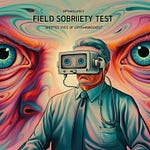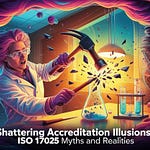What happens when police rely on methods to detect impairment from marijuana that are fundamentally flawed?
According to law professor Bill McNichol, a professor at Rutgers Law School, our current approach to detecting marijuana impairment is built on "pseudoscience" – techniques that appear scientific but lack the rigorous validation that real science demands.
We discuss the challenges of current methods of detection of impairment from marijuana and his recent article in the Journal of Studies on Alcohol and Drugs entitled, Pseudoscience and the Detection of Marijuana-Based Impairment: We Can and Must Do Better.
Clips
Related podcasts
The Eyes Have It (Wrong): Horizontal Gaze Nystagmus Through an Ophthalmologist's Skeptical Lens
The Accuracy of Standardized Field Sobriety Testing (SFST) with Dr. Greg Kane
Challenging the Validity of SFSTs and Drug Recognition Testing with David Rosenbloom
Field Sobriety Testing and Drug Recognition: A Conversation with Noah Pesola
Related links
Pseudoscience and the Detection of Marijuana-Based Impairment: We Can and Must Do Better
Validation of Methods for Detecting Driving Under the Influence of Cannabis: Paths Forward
The standardized field sobriety tests: A review of scientific and legal issues
Drug Recognition Expert Testing: A Critical Review of the Literature
Automated transcript (not checked for errors)
Introduction and Guest Introduction
Aaron Olson: Hi everyone. Welcome back to the podcast. Today I'm here with Bill McNichol. He is an adjunct professor at Rutgers. Law school and a member of the New York and Washington Bar. He has written about the challenges of marijuana impairment detection methods, and he is advocating for a more rational, science-based approach.
He recently wrote a paper which caught my interest called the Pseudoscience, uh, and the detection of marijuana based impairment. We can and must do better. Bill, thanks so much for coming on the show.
Bill McNichol: Good to be with you
The Problem with Current Marijuana Impairment Detection
Aaron Olson: So let's get into the topic of, uh, detecting impairment from marijuana. You titled your paper pseudoscience and the detection of marijuana based Impairment.
Why did you choose that word pseudoscience?
Bill McNichol: Well, I, I chose that word because that seems to aptly describe the techniques that are, uh, most often used, uh, by police who have a, a job to do. No question about it when they're trying to detect people who are impaired by marijuana. Pseudoscience is, uh, sometimes used as a pejorative term.
It's certainly not a flattering term, but it, uh, refers to the use of things that appear to be scientific, but in truth or not.
Aaron Olson: Yeah. And so in the, in the context that we're talking about, um. People, or we want to, no one wants anyone to be impaired driving on the road. And we want a way to detect, uh, impairment from drugs and marijuana.
But we often see these types of tests that really have not a lot of value being used to, to try to detect impairment from marijuana. And then these pseudoscientific tests are then. Admitted in court as evidence of impairment. And that's the big problem that I see is that a lot of these tests don't really show what they're intended to show.
Can you go into that a little bit more?
Bill McNichol: Well, yes, and, and I think you, your opening comment that it's important that we not have people who are impaired on the road, is one that I think there's broad agreement on. Uh, there are some folks who think that they actually drive better when they've. I wanna consume marijuana.
I don't think there's a broad consensus in support of that. Uh, and I think we all have to, uh, rely on the police to do a difficult job, which is to, uh, find anybody who's impaired by anything, whether it's alcohol or marijuana or something else. And it's not, uh, easy to do, and we want them to be able to prove it in court to the satisfaction of an impartial decider, a judge or a jury.
Uh, so they make the effort to try to present their findings as more than just, well, he looked buzzed to me. Uh, which it not only isn't very persuasive, but it's not really a very, uh, appealing way to base your decisions on whether somebody's impaired. And so police have tried to present their personal opinions as to whether someone was impaired when they stopped them on the road.
In a way that at least gives the impression that they're applying more than their own impressions, but they're applying science to the task. Um, they got started doing that by imitating what they did for many years, quite validly with respect to, uh, alcohol based impairment. Um, but that just doesn't translate well to the cannabis arena, and that's where a lot of the problems come from.
Critique of Drug Recognition Experts (DRE)
Aaron Olson: Yeah, you're, you're quite critical of Dres in the paper and you have, you have another paper, uh, adjacent to it, which goes into it in more depth. But, you know, you talk about drug recognition experts, as they're often called, and their methods, you refer to their methods as police science rather than actual science.
What is it that, why are you critical of this, this police science and, and what are your main concerns?
Bill McNichol: Yeah, well the, the term police science has been applied. n Um. ot only to to DRE opinions, but to a great many, uh, superficially, um, scientific looking techniques that police and prosecutors have used in court.
Um, most of them don't bear up Under close examination in 2005, the National Academy of Sciences, uh, did a very long report on, um, the great many of these. Supposedly scientific techniques like blood spatter analysis and great many others, uh, that were presented as, uh, being grounded in science. But work, they all had a, a, uh, common characteristic and that was that they were developed by police, uh, based on their own impressions and their own, uh, speculations as to, uh, the underlying causes of things that they observed.
They tended to validate their own assumptions as to what the causes were for whatever it was that they observed. Um, the problem was science doesn't work that way. Science has done right, doesn't look for things to validate their hypothesis. They look for ways to test their hypothesis and, um. That's one of the things that you'll see it being true of the way Dres drug recognition experts have tried to validate, uh, their procedures.
Aaron Olson: Yeah.
Scientific Validation and Issues with DRE Protocols
Aaron Olson: You know, one of the things that I've seen with the so-called validations of DRE protocols and impairment protocol calls for marijuana is that, um, well there's very circular reasoning, but there's also very little falsification. So you, uh, in the testing that has been done where there are placebo controls and people who haven't taken any drugs compared with people who have often the people who are sober.
Fail a lot of these so-called impairment tests as much as like 40 to 50% of the time. To me that that means that your test doesn't have a lot of meaning.
Bill McNichol: Well, that's right. False positives are one of the biggest criticisms, uh, that can be validly leveled at the DRE protocol. Um, and it's recognized in the substance, uh, use, uh, community as one of the great flaws of the DRE protocol.
You mentioned an article that I, uh, published recently in the Journal of Studies on Alcohol and Drugs. There was an accompanying article by Dr. Markot from University of California. And he, uh, listed that as probably the first area of research that was required in order to try to reform the DRE protocol to, uh, determine just how extensive these false positives are.
Um, taking a step back from that, and I completely endorse that view, uh, it reflects the. Tendency among these police conducted validation studies to look for things that validate their preconceived view of the usefulness of the DRE protocol, rather than to look for things that test the accuracy of determinations made using the DRE protocol.
Aaron Olson: Yeah. W what do you think it is? Why do you think these tests persist, and why do you think they're so often allowed in court as evidence of impairment when we have so much evidence already, even though more work needs to be done, but we already have a lot of evidence to show that these tests are not very accurate.
Bill McNichol: Well, it's important to not rely just on a police officer coming into court and saying, he looked buzzed to me. He looked impaired to me. People can legitimately doubt that. Defendants tend to deny it, and so there is a real need for objective measures of impairment. That's why the 0.1% or 0.08% blood alcohol, uh, standard is so appealing 'cause it's backed up by rock solid science.
That there, the, the impairment really does kick in at that point. So having set that precedent, people wanna follow it. People wanna see something just like that, that they can rely upon in the context of cannabis Problem is. There isn't something like that. There are two different, uh, substances, or actually there's, alcohol is a single substance.
Cannabinoids are a whole class of, of varying substances and their biochemistry, how they affect their physi, the physiology of the body and the, and you know, the causing impairment just completely different. And so you can't just do with marijuana what you did with alcohol, it just doesn't work. But the impulse to imitate.
t he uh, very successful precedent of blood alcohol, uh, is apparently irresistible.
Aaron Olson: Yeah, yeah, yeah. When we seen certain numbers on a test, uh, we want to, we, we want to assign meaning to those numbers, and that just simply cannot, can't always be done. Especially in this case. Yeah.
Bill McNichol: Another point is that the people who make the laws and people who enforce the laws aren't chemists and they aren't physiologists and they aren't behavioral psychologists.
Um, they're lawmakers and I give them all complete credit for their sincerity and good intentions. I, I don't think that this is driven by, um. Malevolent intent? Not at all. Okay. Best of intentions. Um, but they're simply out of their depth, uh, in trying to replicate what was done with alcohol in, uh, of context of cannabis.
The work that was originally done by, um. Dr. Hadden and others in the context of blood alcohol as an indicator of impairment, was done by physicians physiologists, behavioral psychologists, statisticians. Um, there was a lot of heavy technical lifting that went in to validating, uh, that marker of impairment.
And you can't take well-meaning legislate legislatures and. Uh, police officers and just say, well, I, I don't have to have that same kind of technical heft. I'll just analogize it because I think it's a good idea. Uh, there has to be more scientific rigor, uh, before you can adopt something as a, in valid indicator of impairment.
Challenges with Per Se Limits for Marijuana
Aaron Olson: How about, you mentioned, uh, per se limits. Mm-hmm. Tell me more about why per se limits won't work, uh, in marijuana. Well,
Bill McNichol: they don't work. That's just been proven so empirically. We, we've, we've had studies, a lot of studies that show that there's levels of cannabinoid in people's body, fluids, blood, saliva, whatever, uh, and they're clearly not impaired.
So at the first level right there, we just know it doesn't work and the studies are out there and it's impossible to argue with, and there's just two darn many of them. Um, to go a little bit deeper and to answer your question, why is that the case said, alcohol and cannabinoids are chemically a heck of a lot different.
Alcohol's a very small, simple, uh, water-soluble molecule. We're all familiar with how alcohol dissolves some water. Uh, we use that. Um. On a daily basis. Many people, um, cannabinoids are fat-soluble molecules and they're not a single molecule. There's a whole bunch of different molecules, uh, and sometimes they get metabolized into other molecules that in turn have physiologic effects.
None of that's the case with alcohol. Uh, you're talking about affecting your brain, which is the seat of most of the impairment or. Control things that you don't wanna be impaired. Um, and to get across the barrier into the brain is a completely different situation for water-soluble molecule like alcohol and a lipid-soluble molecule like a cannabinoid.
So the chemistry is, is different in the way they're metabolized is different. And so that helps to explain the, um. Observation, very consistent observation that blood levels of cannabinoids or bodily fluid levels of cannabinoids don't correlate with impairment. I, I think it's widely known, um, and understood that if you administer a test to somebody to see if they've used marijuana, cannabinoids will show up a week or more after they've used cannabinoids.
So, uh, that should tell you, um. Why the physiology is different or how it just not just doesn't work the same way.
Aaron Olson: Yeah.
Proposed Solutions and Future Directions
Aaron Olson: Te in your, in your article you mentioned that we need to have different ways of evaluating impairment and, uh, you propose a couple of those ways. Tell me more about what you realistically see going forward, uh, as better ways of determining impairment from drugs like marijuana.
Bill McNichol: Well,
Aaron Olson: the, um.
Bill McNichol: The, the answer to that question is to some extent unknown. Uh, that's why we need science to kick in here and, and get the work done. But areas that are promising, uh, that scientists are actually pursuing with a great deal of interest include. Several areas. One is an increased use of behavioral, uh, or psychomotor tests.
They're by no means infallible, but they can be refined and used, um, in a more limited fashion as indicators of impairment. And then there's a lot of chemistry yet to be done. Um, and we have to work on that and find different metabolites perhaps or different markers, uh, in different fluids that are more.
Closely correlated with impairment than the fairly blunt instrument of, uh, cannabinoid level in saliva or blood. So, uh, you've asked the big question and the uh, answer is not yet known. If we knew the answer to that question, we would've entered a new era of impairment detection, uh, in the context of cannabis.
Aaron Olson: Um. As we think about takeaways from your recent article and your, your research, um, what are better approaches or what, what would you want listeners to this podcast to take away from it, uh, as they go about looking at their cases and, uh, perhaps, you know, uh, defense attorneys or prosecutors that may be listening to this.
Bill McNichol: Well, it's a, it's a difficult, uh, task for most defense attorneys because their clients don't have the resources to fund a full throated challenge, uh, to Dre. Uh, and that's just a, a problem that, that Peter Neufeld noted in 2009 in the context of a lot of police science. Uh, it's completely true in this, uh, context here.
Um, but I think what we ought to look at. Uh, is, uh, follow on blood testing. So if A DRE opines that a person was impaired, uh, they al almost always opine. Not just that they were impaired, but they were impaired by specific compound or a specific class of compounds. If the, um, follow on blood work doesn't indicate that there was, uh, that.
Uh, compound or class of compounds present, that would be an excellent, uh, way to argue against the credibility of the DRE. Um, enforcing that and making sure that it was done properly, um, is sometimes a bit more than most defendants are willing or able to pay for. Some states simply require it. Um, New Jersey, for example, is, uh, has pretty much started to require that, uh, there be confirmatory biochemical results.
Um, so you should look to see what your, uh, your state's case law requires, um, but in the absence of a confirmatory, uh, biochemical marker. Of that particular compound being used, I think you've got a good basis for undermining the Dre's testimony. DRE says you've been impaired by using a central nervous system depressant, and there are no central nervous system depressants in your client's, uh, body fluids.
Um, the fact that they might say, oh, oh no, I really meant marijuana, and they make that change while they're on the stand. Uh, it would be an excellent way of, uh, undermining the credibility of, uh. Of that testimony.
Aaron Olson: Yeah.
Final Thoughts and Conclusion
Aaron Olson: Well, I, I think we covered a lot of what was in your paper. Is there anything that I didn't ask you that you would want people to know who are listening to this?
Who would be, uh, forensic scientists, um, defense attorneys, prosecutors, anything that I didn't ask that you think that they should know before we conclude the.
Bill McNichol: I think we have to, um, really make an honest effort, uh, at, at coming up with a, a better solution than we have now. Uh, too often people fall into camps or perceive themselves as falling into camps or people who care about, uh, drivers who are impaired and people who don't care about drivers who are impaired.
Um, and I think that's a false dichotomy. I think we. For the most part, we all care that drivers who are impaired be, um, kept off the roads and if they're on the roads, they should be given, uh, appropriate punishment to serve as a deterrent for others. That, that, that's a legitimate function, uh, of governance.
It's an important function. So the first thing I would do is, is. Trying to build walls, um, on the basis of an artificial distinction. We all agree that impairment's a problem and has to be addressed. And if we all buy into that, then nobody should be threatened by the pursuit of rigorous science that will provide a valid marker of impairment.
Uh, the next thing to do is to actually get behind funding, uh, and supporting, uh. That basic science, it needs to be done and it can be done. There are a lot of people in, um, the field who want to do the work and, uh, they should be funded fully and their work should be respected and made the basis of the, um.
The policy discussion, uh, I give police full credit for their good intentions, but they're not physicians, they're not physiologists, they're not behavioral psychologists. And police should get behind doing better, more reliable science, uh, and that'll make their work easier and it'll give greater credibility to their testimony and it'll make their job easier.
So I would, uh, I would urge that all that happen and, and happen with the support of all concerned.
Aaron Olson: Well, bill, thanks so much for publishing this interesting article and for coming on the podcast today to talk more about it. I really appreciate you being here. It's been a pleasure.











